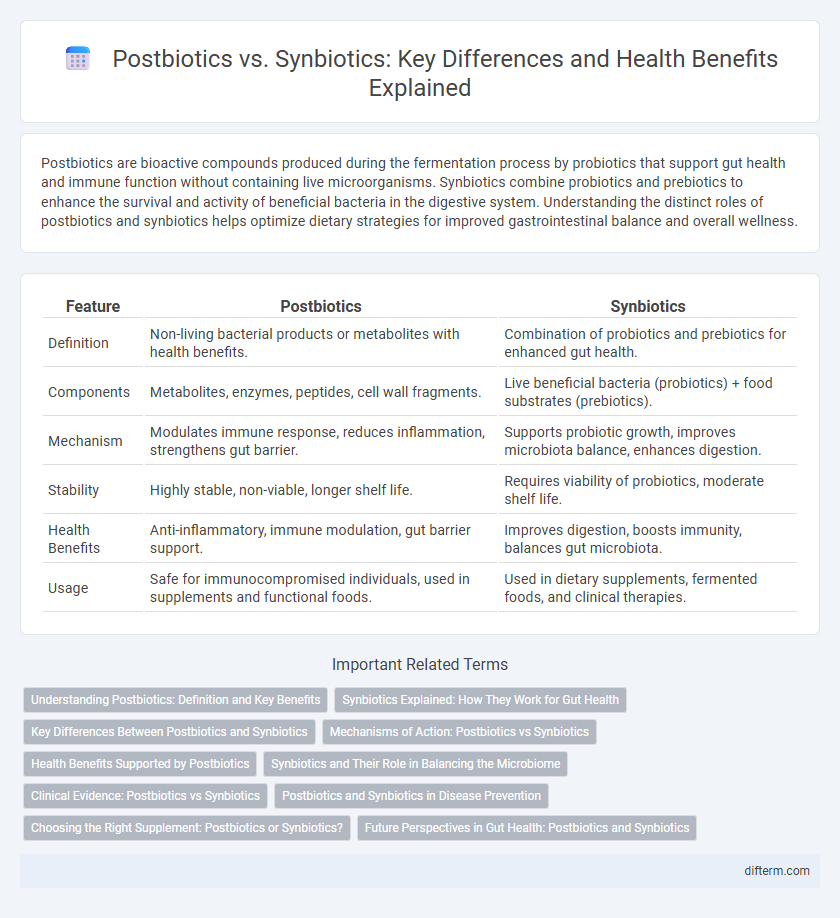Postbiotics are bioactive compounds produced during the fermentation process by probiotics that support gut health and immune function without containing live microorganisms. Synbiotics combine probiotics and prebiotics to enhance the survival and activity of beneficial bacteria in the digestive system. Understanding the distinct roles of postbiotics and synbiotics helps optimize dietary strategies for improved gastrointestinal balance and overall wellness.
Table of Comparison
| Feature | Postbiotics | Synbiotics |
|---|---|---|
| Definition | Non-living bacterial products or metabolites with health benefits. | Combination of probiotics and prebiotics for enhanced gut health. |
| Components | Metabolites, enzymes, peptides, cell wall fragments. | Live beneficial bacteria (probiotics) + food substrates (prebiotics). |
| Mechanism | Modulates immune response, reduces inflammation, strengthens gut barrier. | Supports probiotic growth, improves microbiota balance, enhances digestion. |
| Stability | Highly stable, non-viable, longer shelf life. | Requires viability of probiotics, moderate shelf life. |
| Health Benefits | Anti-inflammatory, immune modulation, gut barrier support. | Improves digestion, boosts immunity, balances gut microbiota. |
| Usage | Safe for immunocompromised individuals, used in supplements and functional foods. | Used in dietary supplements, fermented foods, and clinical therapies. |
Understanding Postbiotics: Definition and Key Benefits
Postbiotics are bioactive compounds produced during the fermentation process by probiotics, including metabolites such as enzymes, peptides, and organic acids that contribute to gut health. These substances enhance the immune response, reduce inflammation, and support the balance of gut microbiota without the need for live bacteria. Unlike synbiotics, which combine probiotics and prebiotics for synergistic effects, postbiotics provide direct health benefits through stable, non-viable microbial products.
Synbiotics Explained: How They Work for Gut Health
Synbiotics combine probiotics and prebiotics to enhance the survival and colonization of beneficial gut bacteria, promoting a balanced microbiome. They work by delivering live beneficial microbes alongside specific fibers that nourish these bacteria, improving digestion and immune function. Research shows synbiotics may reduce inflammation, enhance nutrient absorption, and support overall gut health more effectively than probiotics or postbiotics alone.
Key Differences Between Postbiotics and Synbiotics
Postbiotics are bioactive compounds produced during the fermentation of probiotics, offering direct health benefits such as immune support and gut barrier enhancement without introducing live bacteria. Synbiotics combine probiotics and prebiotics to synergistically improve the survival and implantation of beneficial microbes in the gut, promoting a balanced microbiome. The key difference lies in postbiotics providing non-living microbial byproducts that influence host health, while synbiotics deliver live bacteria with their nutrient substrates for gut colonization and microbiota modulation.
Mechanisms of Action: Postbiotics vs Synbiotics
Postbiotics exert their health benefits primarily through bioactive compounds like short-chain fatty acids, enzymes, and peptides that modulate immune responses and enhance gut barrier function. Synbiotics combine prebiotics and probiotics, promoting probiotic survival and activity by selectively stimulating beneficial microbial growth, which improves microbiome balance and metabolic functions. The synergistic mechanisms in synbiotics result in amplified effects on gut health compared to the direct bioactive impact of isolated postbiotics.
Health Benefits Supported by Postbiotics
Postbiotics provide health benefits by enhancing gut barrier function, modulating immune responses, and exhibiting anti-inflammatory properties. Research shows postbiotics contribute to improved digestion, reduced risk of infections, and balanced gut microbiota without the need for live bacteria. These compounds support overall health by producing bioactive metabolites that aid in metabolic regulation and intestinal health.
Synbiotics and Their Role in Balancing the Microbiome
Synbiotics combine probiotics and prebiotics to enhance gut health by promoting beneficial bacterial growth and activity. They improve the balance of the microbiome, supporting digestive function and boosting immune response. Research shows synbiotics help maintain microbial diversity, restore gut flora after antibiotic use, and reduce inflammation.
Clinical Evidence: Postbiotics vs Synbiotics
Clinical evidence reveals that postbiotics, which are non-living microbial byproducts, provide anti-inflammatory and immune-modulating benefits with fewer side effects compared to synbiotics, which combine probiotics and prebiotics. Randomized controlled trials indicate synbiotics improve gut microbiota diversity and metabolic health more effectively in conditions like irritable bowel syndrome and type 2 diabetes. Comparative studies emphasize postbiotics' stability and safety profile, making them promising for patients who are immunocompromised or intolerant to live probiotics.
Postbiotics and Synbiotics in Disease Prevention
Postbiotics, which are bioactive compounds produced by probiotic bacteria, enhance immune function and reduce inflammation, playing a crucial role in disease prevention. Synbiotics combine probiotics and prebiotics to synergistically improve gut microbiota balance, enhancing metabolic health and lowering risks of infections and chronic diseases. Research indicates that integrating postbiotics and synbiotics into daily regimens supports gut barrier integrity and modulates signaling pathways vital for preventing gastrointestinal and systemic illnesses.
Choosing the Right Supplement: Postbiotics or Synbiotics?
Choosing the right supplement depends on individual gut health needs; postbiotics provide metabolic byproducts from probiotic bacteria that support gut barrier function and reduce inflammation, while synbiotics combine probiotics and prebiotics to enhance microbial balance and promote digestive health. Research indicates synbiotics are particularly effective in improving microbiota diversity and boosting immune response, beneficial for those with dysbiosis or weakened immunity. Postbiotics offer advantages for individuals seeking anti-inflammatory benefits without live bacterial supplementation, making personalized assessments essential for optimal gut health outcomes.
Future Perspectives in Gut Health: Postbiotics and Synbiotics
Postbiotics and synbiotics represent emerging frontiers in gut health, with postbiotics offering stable bioactive compounds that enhance gut barrier function and modulate immune responses. Synbiotics combine probiotics and prebiotics to synergistically improve microbial diversity and metabolic activity, supporting personalized nutrition strategies. Future research emphasizes optimizing formulation and delivery mechanisms to maximize therapeutic outcomes in chronic gastrointestinal diseases and metabolic disorders.
Postbiotics vs Synbiotics Infographic

 difterm.com
difterm.com